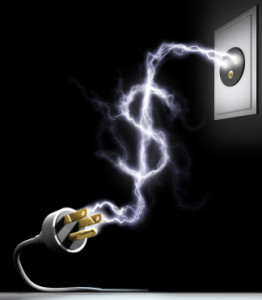How To Cut Down Your Utilities Bill
 How to Cut Down Your Utilities Bill
How to Cut Down Your Utilities Bill
Now that it seems likely we’ll be facing a double-dip recession most of us will be looking at more ways to tighten the belt whilst the fat-cats carry on stuffing their faces with cake and Champaign – ok – that’s enough politics – there are serious matters at hand here, so let’s take a look at how we can help ourselves instead of just crying about it!
Below are some splendid energy saving tips that should help you save quite a bit of coinage in the coming year – remember you might not have the time or energy to put all of these into action but even one or two of them could have a notable impact on your finances.
No Investment Required
Wash smart – taking a shower uses around 50% less water than a bath, which means you’ll be saving up to 10% on your overall heating bill – and if you have a water meter you’ll also be saving on water rates too.
Wash smart #2 – make sure you only run your washing machine with a full load or ensure you set it to a low energy/eco-friendly setting to make sure you’re not wasting hot water and therefore money.
Cook smarter – when you’re boiling water in a pan make sure you always keep the lid on as the water will boil much faster and will waste less energy. Also don’t put too much water in the kettle, just use as much as you need for your tea. If we all followed this simple rule for a whole year the UK could save enough electricity to power half the county’s street lights for the next year!
Minimal Outlay
Have a Light Bulb Moment – energy saving bulbs have now dropped in price and they’re now so efficient they use up to 80% less electricity than a traditional bulb and can last up to 10 times longer. In their average lifespan an energy saving bulb should save you around £45.
Get suited and booted – well – not a real suit, just a jacket, and for your boiler not for you. This is relatively easy going in terms of effort and cost; buying a 75mm jacket for your boiler should save you around £40-£50 a year so the boiler-jacket will pay itself off in just 3-4 months.
Radiation Measures – if your radiator is on an external wall you could be losing as much as 20% of your heat through the walls. Instead purchase radiator panels and place them behind these radiators to help reflect heat back indoors. This could save around £60 a year for the average family.
Higher Cost Options
Feed from the Sun – sadly for us locals the UK is not the sunniest spot in the world – but it should still be worth considering solar panels. Costs vary widely from supplier to supplier but the average UK household could generate around 40% of their total electricity bill year on year so it should be fairly easy to calculate if it’s a cost effective solution for your home.
Double Glaze to Feel the Blaze – this is one of the more expensive options but in the long run it’s as simple as this – twice as much glass equals half the heat loss. Double glazing also cuts down noise pollution so your home will be more of a relaxing and tranquil environment. Installation costs vary widely but with savings of around £150 a year compared to a non-double-glazed home this is an investment which will slowly but surely pay for itself with dividends.
Insulate don’t Hesitate – many homes in the UK don’t have adequate or any loft and cavity-wall insulation. If you live in an old building you’re probably losing around 30% of your heat through the roof. Insulating an average family home’s loft costs around £200-£300 but should save you around £150 a year so it would have paid for itself in just 3 years. The same can be said for wall insulation which also has roughly the same cost/benefit ratio.
With this list of potential money saving options you should be ready to face 2013 with a lighter heart when it comes to worrying about your energy bills.
I am a copywriter and poet with a bachelor’s degree in English Language and Creative Writing. I have worked in various marketing & creative roles since 2001. My aim is to publish at least one novel before I die – so far I have had 2 poems published internationally in print as well as some online. In my professional capacity I currently work for an advertising agency in London.
















